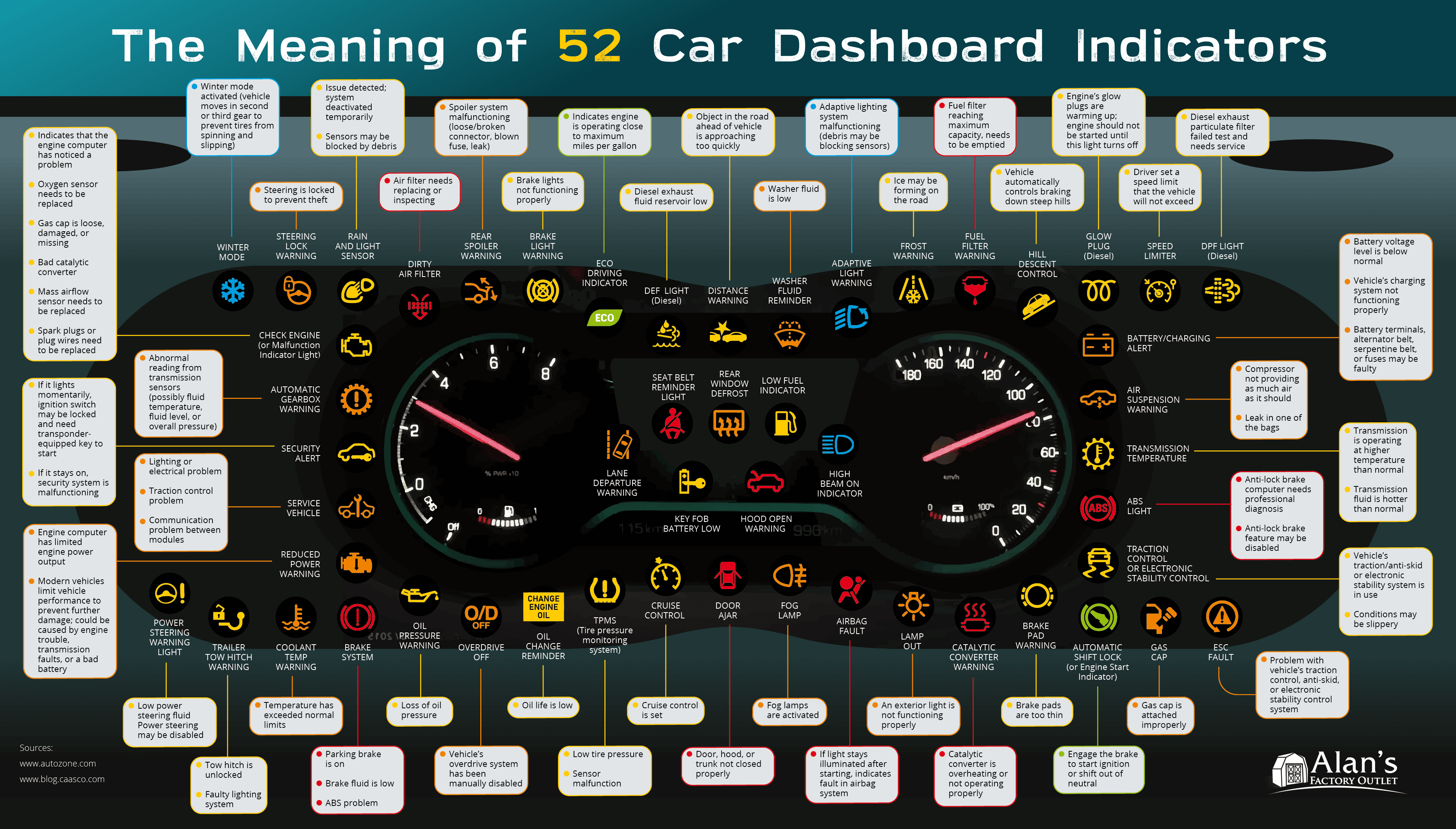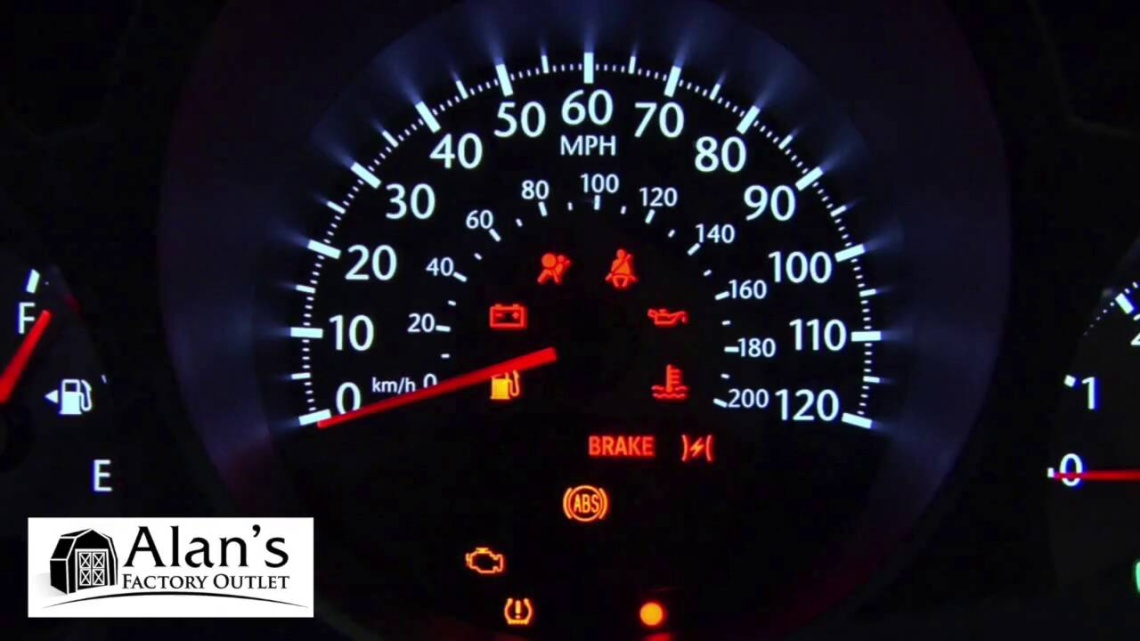There’s a lot to learn when you first start to drive a car, such as how to turn and brake and what all of the different road signs mean. One aspect of driving and maintaining a car that isn’t covered in as much depth as it should be is what the many dashboard lights mean. The team at Alan’s Factory Outlet put together this visual guide to provide insight into the 52 car dashboard symbols and meanings that may appear to warn of potential issues with your vehicle.
These car warning lights are meant to alert the driver to an issue that the vehicle is experiencing so they can take care of it before it becomes worse (and ultimately more costly). Car maintenance isn’t cheap, but paying attention to what your vehicle is trying to tell you can help keep car maintenance costs down. This guide to car lights is beneficial to not only new drivers but veteran drivers who may only recognize what a handful of these car symbols mean. The colors and locations of each dashboard icon may vary, so it is still crucial to consult your vehicle’s user manual for a more precise interpretation of its warning lights. One important detail to remember when it comes to dashboard warning lights is that if the light is on but not blinking, the issue is not urgent, but if the warning light is on and blinking, the issue needs to be taken care of immediately. Prudent action, regular maintenance, and an understanding of car warning signs can help keep your car running as efficiently as possible. In addition to sharing what these car dashboard symbols mean, we’ve also included some important tips that can help keep your car maintenance costs down over the lifetime of your vehicle.
Click on the image to view full size

Here is a printable PDF of The Meaning of 52 Car Dashboard Indicators – feel free to share and print
When Were Car Dashboard Indicators First Used?
Car dashboard indicators were first used in the mid-1930s. The Hudson Car Company was the first manufacturer to install dashboard lights in their automobiles, in place of the gauges that had been used for oil pressure and the voltmeter. Drivers were frustrated by the new use of these warning lights in place of the gauges, since they made it difficult to detect issues early; the lights only activated after a fault had already occurred. This didn’t offer much warning before the vehicle would break down, which lead to drivers referring to them as “idiot lights.” Automakers began phasing “idiot lights” out in the 1980s when more modern technologies began to emerge. Built-in diagnostic systems could now trigger a light when a problem was initially detected, giving the driver time to bring the vehicle to a mechanic before it broke down. It wasn’t until 1996 that car dashboard lights were standardized across the industry and regulated by automobile safety standards, which made it far easier to diagnose the issue that triggered the dash lights.
What Is the Average Cost of Maintaining a Car?
The cost of a car goes far beyond its sticker price, as cars need to be regularly maintained to keep them running efficiently and to get many miles out of them. The average annual cost of car maintenance is $792, or $66 a month, according to AAA. A car maintenance schedule includes things like regular oil changes, tire rotation, and keeping the tires properly inflated. Maintaining a vehicle is the easiest it’s ever been now that vehicles come equipped with dashboard indicators that alert the driver to necessary maintenance tasks, such as an oil change after a certain number of miles, when the air pressure in a tire is low, or if there’s an issue with the engine. No one likes to see the “check engine” light appear on their dashboard, and proper maintenance can help you to avoid this dreaded indicator. The following car maintenance tips will not only help to extend the life of your car, but they’ll also help to keep your car repair costs down along the way.
5 Tips to Keep Car Maintenance Costs Down
- Change the engine oil and the air filters regularly throughout the year, which is every 3,000 to 5,000 miles for most cars. Regularly getting your oil changed will help keep the engine running efficiently, and changing the air filter will not only keep the air you’re breathing cleaner but also keep your air conditioning system in top shape.
- Check the air pressure in your car’s tires every month to make sure they’re properly inflated. This is especially important when the temperatures get colder, as the cold causes the air pressure in tires to drop. You’ll also want to check the air pressure in your spare tire so that it’s ready to drive on if you ever need it in an emergency.
- Rotate your tires to get the most life out of them. The front and back set of your vehicle’s tires can wear down at different rates, and making sure to rotate them every so often can extend their life and save you money on a new set of tires.
- Check the fluids in your car regularly to make sure they’re not getting too low and affecting how well your vehicle operates. The fluids to regularly check include the coolant, which keeps the heat and air conditioning, radiator, and pump running smoothly; the oil level, to keep the engine running smoothly; and the window washer fluid, to keep the windshield free of dirt and debris that could obstruct your view.
- Pop the hood and inspect the belts and hoses for wear. Worn-out belts can cause a lot of damage to your car’s engine if they break, and it’s a far cheaper fix to replace a belt or hose rather than having to replace the entire engine.
| Light | What it Means or Could Mean (if applicable) |
| Check Engine (or Malfunction Indicator Light) | Indicates that the engine computer has noticed a problem Oxygen sensor needs to be replaced Gas cap is loose, damaged, or missing Bad catalytic converter Mass airflow sensor needs to be replaced Spark plugs or plug wires need to be replaced |
| Coolant Temp Warning | Temperature has exceeded normal limits |
| Oil Pressure Warning | Loss of oil pressure |
| Service Vehicle | Lighting or electrical problem Traction control problem Communication problem between modules |
| Brake System | Parking brake is on Brake fluid is low ABS problem |
| ABS Light | Anti-lock brake computer needs professional diagnosis Anti-lock brake feature may be disabled |
| Cruise Control | Cruise control is set |
| Security Alert | If it lights momentarily, ignition switch may be locked and need transponder-equipped key to start If it stays on, security system is malfunctioning |
| Traction Control or Electronic Stability Control | Vehicle’s traction/anti-skid or electronic stability system is in use Conditions may be slippery |
| Overdrive Off | Vehicle’s overdrive system has been manually disabled |
| Washer Fluid Reminder | Washer fluid is low |
| Battery/Charging Alert | Battery voltage level is below normal Vehicle’s charging system not functioning properly Battery terminals, alternator belt, serpentine belt, or fuses may be faulty |
| Transmission Temperature | Transmission is operating at higher temperature than normal Transmission fluid is hotter than normal |
| Oil Change Reminder | Oil life is low |
| TPMS (Tire Pressure Monitoring System) | Low tire pressureSensor malfunction |
| Reduced Power Warning | Engine computer has limited engine power output Modern vehicles limit vehicle performance to prevent further damage; could be caused by engine trouble, transmission faults, or a bad battery |
| Gas Cap | Gas cap is attached improperly |
| ESC Fault | Problem with vehicle’s traction control, anti-skid, or electronic stability control system |
| Lamp Out | An exterior light is not functioning properly |
| Door Ajar | Door, hood, or trunk not closed properly |
| Airbag Fault | If light stays illuminated after starting, indicates fault in airbag system |
| Fog Lamp | Fog lamps are activated |
| Automatic Shift Lock (or Engine Start Indicator) | Engage the brake to start ignition or shift out of neutral |
| Low Fuel Indicator | |
| Seat Belt Reminder Light | |
| Rear Window Defrost | |
| Automatic Gearbox Warning | Abnormal reading from transmission sensors (possibly fluid temperature, fluid level, or overall pressure) |
| Trailer Tow Hitch Warning | Tow hitch is unlocked Faulty lighting system |
| Catalytic Converter Warning | Catalytic converter is overheating or not operating properly |
| Brake Pad Warning | Brake pads are too thin |
| Power Steering Warning Light | Low power steering fluid Power steering may be disabled |
| Brake Light Warning | Brake lights not functioning properly |
| Distance Warning | Object in the road ahead of vehicle is approaching too quickly |
| Air Suspension Warning | Compressor not providing as much air as it should Leak in one of the bags |
| Fuel Filter Warning | Fuel filter reaching maximum capacity, needs to be emptied |
| Frost Warning | Ice may be forming on the road |
| Steering Lock Warning | Steering is locked to prevent theft |
| Dirty Air Filter | Air filter needs replacing or inspecting |
| Speed Limiter | Driver set a speed limit that the vehicle will not exceed |
| Lane Departure Warning | |
| Key Fob Battery Low | |
| Hood Open Warning | |
| Winter Mode | Winter mode activated (vehicle moves in second or third gear to prevent tires from spinning and slipping) |
| Rain and Light Sensor | Issue detected; system deactivated temporarily Sensors may be blocked by debris |
| Rear Spoiler Warning | Spoiler system malfunctioning (loose/broken connector, blown fuse, leak) |
| Eco Driving Indicator | Indicates engine is operating close to maximum miles per gallon |
| High Beam On Indicator | |
| Adaptive Light Warning | Adaptive lighting system malfunctioning (debris may be blocking sensors) |
| Hill Descent Control | Vehicle automatically controls braking down steep hills |
| Glow Plug (Diesel) | Engine’s glow plugs are warming up; engine should not be started until this light turns off |
| DPF Light (Diesel) | Diesel exhaust particulate filter failed test and needs service |
| DEF Light (Diesel) | Diesel exhaust fluid reservoir low |
Take care of your car by protecting it with a sturdy metal carport for sale or custom metal garage for sale from Alan’s Factory Outlet!


